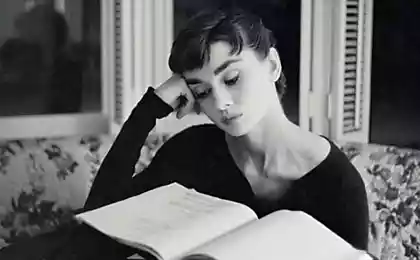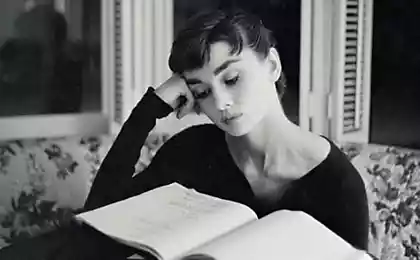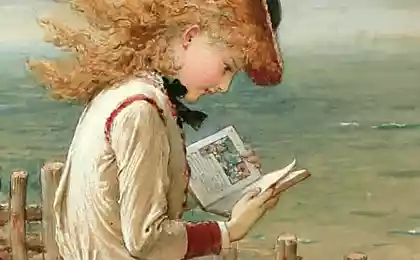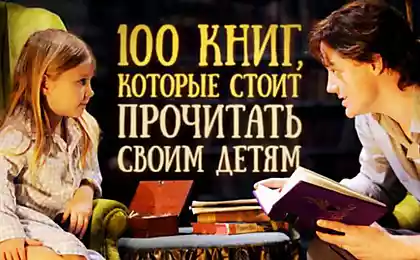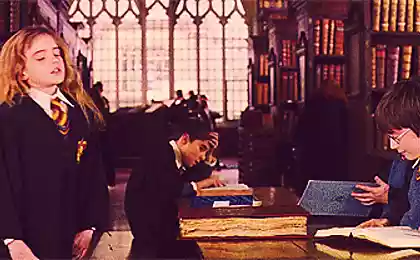685
How to read the books
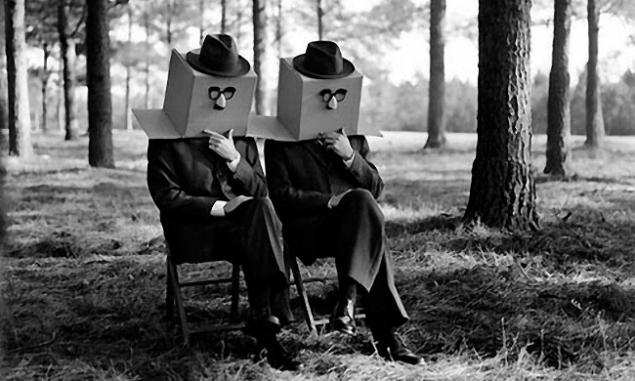
- writer and teacher of literature are related in the same way as an astronomer and astrologer. It would seem that both about the stars, but where the author captures the supernova, the teacher often sees something resembling rather horoscope: "Capricorn tomorrow expect a tough day, beware of conflicts at work, traffic lights and oatmeal».
We all remember that "astrology" from school: purple dress Anna Karenina, gray, lifeless sky of Austerlitz, and "Bazarov using rose metaphorically asked about love, albeit small, even for a brief moment" (about Bazarov - this is no joke, and actual quote from the manual for teachers).
Writer shows them to the moon, and they look at the finger. Not only watching, so even manage to comment on this finger, "as he points a finger at the moon, a symbol! This means something! Finger - This is the finger pointing, a reference to the Bible, the Gospel of Mark, Chapter Six, verse twenty, exactly! »
Ale, a moron, I showed you the moon, stop analyzing my finger.
Do not misunderstand me: I do like to look Allusions / references / symbols. Any good novel / story filled them to capacity. And, of course, a gray, lifeless sky Austerlitz and purple dress Anna - a very important part, Tolstoy did not just screw them to the story. Here, in fact is another question: when we listen to music we enjoy is tune, we do not perceive it as a set of notes and registers. To love Beethoven, it does not necessarily know what a fugue, and the overture differs from the sonata, and why Nocturne - is not the same thing as the Quartet (although it would seem, sounds similar). And with classical literature in the same way - you will be surprised, but you can just read. For pleasure. Without all this philological "astrology", allegorical symbols and other things. Seriously.
There is such a novel: its main character - an officer; a hundred pages of text he can: (a) to kidnap a woman, (b) to shoot his friend, (c) almost die at the hands smuggler, (d) to take part in the raid and detain the murderer of his own.
Oh, and - there is a non-linear narrative. The order of the chief there, but it does not match the date of publication.
You know, what is this book?
"The hero of our time».
Recently, I spent such an experiment: the story told "Hero ..." to their friends and asked to guess the book. The correct answer was given by only two people out of ten.
"I remember that Pechorin - overweight people, but do not remember why ...»
"So, wait, I forgot, and Pechorin - it once or a small man? Or maybe he was "low man"? »
"I am at the school was convinced that Pechorin - a doctor, because the teacher kept saying that he has put the era of diagnosis».
"There have been smugglers? If so, I'm sure - they were engaged in smuggling of boredom? »
These are all real quotes. Of these, one thing is clear: no one (or almost no one) of us perceives the "Hero ..." as the whole story, filled with vivid characters and sadness; Lermontov's novel, many consistently associated with secondary okoloshkolnymi memories: Belinsky with notes of "superfluous man", "social criticism", dealing with the Emperor Nicholas, with Pushkin.
These "extra people" - children in literature classes. Their interests are neglected.
The same problem with "The Overcoat." The school will tell you about the most important idea of the "little man", "social satire", "compassion" and in general "we all came out of Gogol's overcoat." The brains of children so diligently stuffed "historical / social contexts" and "literary process" that eventually escapes from them the most important thing - fun. But "The Overcoat" - a very funny story. True. For example, the scene of the death of Akaky:
"The phenomena of one other country, appeared to him constantly: that he saw Petrovich and ordered him to make his coat with some traps for thieves who chudilis him constantly under the bed, and he constantly called for the landlady to pull him a thief, even from under the blanket ; the question is, why is hanging in front of him his old hood, that he has a new cloak; it seemed to him that he was standing in front of the general, listening to the proper raspekane, and says: "Excuse me, Your Excellency!" - that finally even skvernohulnichal, uttering the most terrible words, so that the old lady hostess even baptized, he has never having heard anything from him like, the more that these words are followed immediately after the word "your excellency." Then he talked utter nonsense, so it was impossible to understand; it was only possible to see that the random words and thoughts tossed around the same uniform. Finally, poor Akaky gave up the ghost ».
I think it's one of the funniest descriptions of its death agony in the literature. Bashmachkin are not sorry. And yet, children are still convinced that Gogol called "regret" the little man "and that because of this his greatcoat came Dostoevsky.
I constantly hear from people: "I'm afraid to read Joyce / Dante / Pynchon, he's too smart, there commentaries and interpretations more than the book itself, I do not understand, I feel stupid / dumb, I open his book, I did not pull it ».
This neurosis is familiar to many - because we have a child intimidated by little people and big ideas, accustomed to the fact that the classics - this hoo-th (shaking his finger in the air)! To it just does not get at it! This is not in the nose poking around it - "look at the face of tragedy, will see her wrinkles," and if you have not realized that symbolizes the purple dress, split by lightning oak and the sky of Austerlitz and rose Bazarov (that there is something allegorically symbolizes yeah ) and why the name of the protagonist of "Daedalus" and where are bananas and V-2 rocket, then you should be ashamed. Ignoramus!
And here and there.
You are mistaken.
Do not know - not ashamed.
It's a shame - does not want to know.
This inferiority complex - "you still do not understand" - like the green glasses, worn by residents of the Emerald City.
I envy people who read "Anna Karenina" in 1877, as she came out in a thick journal. They read with a clean slate, for fun, for the sake of history, they did not know that Tolstoy there is something there, "thought the family" and that the image of the metal in the book is very important. I sometimes imagine the shock of the first reader: "O Lord! Anna, do not, do not do it! "Today, her act is no longer a spoiler. But how do you want to see the face of a man in 1877, read to the scene at the train station.
In fact, it is so for the first time need to read classic literature. For example, if a book fresh from the printing press, even if there is a vast body of related texts, interpretations, theses, anecdotes, speculation and other green points Philology of the Emerald City. These points you always have time to put on, take your time.
After all, if you open the Dante / Kafka / Rabelais / thick / Joyce / Pynchon just for the sake of pleasure, then sooner or later you will feel that the book "complex Writers' good unbearably good, even without comment. Especially without comment.
The school must educate the children's curiosity, not awe before the great names and great ideas. Because a real teacher - a man, conversing with whom you seem to yourself smarter than you really are. Not the other way around.
Author: Alex Polyarinov
Also read:
Why is our future depends on reading
33 reasons why we are obsessed with reading
via www.adme.ru/vdohnovenie-919705/33-prichiny-pochemu-my-pomeshany-na-chtenii-652605/



